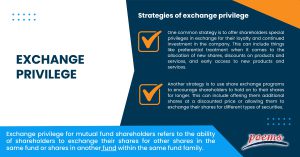Exchange privilege
Table of Contents
Exchange privilege
All traders can benefit from exchange privileges, but DIY investors value them more. Some investors could decide to use this privilege as part of their entire investment plan, which is simpler to use when opening a family of fund account.
Exchange privileges can be a helpful tool for investors too. By understanding how they work, investors can use them to their advantage.
What is exchange privilege?
Exchange privilege for mutual fund shareholders refers to the ability of shareholders to exchange their shares for other shares in the same fund or shares in another fund within the same fund family.
This privilege can be helpful for investors who want to rebalance their portfolios or who want to take advantage of changes in the market. The exchange privilege may be subject to certain conditions, such as a minimum holding period or a fee.
Understanding exchange privilege
Investors in mutual funds often can exchange ownership from one fund to another within the same fund family. This is an exchange privilege, and it can be a valuable tool for investors.
Exchange privileges can be used to rebalance a portfolio or take advantage of market changes. For example, an investor might exchange ownership of a fund that has lost value for a fund that has gained value.
Exchange privileges can also move from a fund with a higher expense ratio to a fund with a lower expense ratio. This can be important for investors who are looking to keep costs down.
Investors should be aware of exchange privileges’ rules and regulations, as there may be some restrictions. For example, some fund families may only allow exchanges between certain funds. Others may charge a fee for exchanges.
Strategies of exchange privilege
There are several strategies that companies can use to exchange privileges with shareholders.
- One common strategy is to offer shareholders special privileges in exchange for their loyalty and continued investment in the company. This can include things like preferential treatment when it comes to the allocation of new shares, discounts on products and services, and early access to new products and services.
- Another strategy is to use share exchange programs to encourage shareholders to hold on to their shares for longer. This can include offering them additional shares at a discounted price or allowing them to exchange their shares for different types of securities.

Advantages and disadvantages of exchange privilege
Advantages of exchange privilege
- First, it allows shareholders to exchange their shares for new company shares if the company undergoes a reorganization. This can benefit shareholders if the new shares are worth more than the old ones.
- Second, the exchange privilege allows shareholders to exchange their shares for shares of another company if another company acquires the company. This can benefit shareholders if the new company is doing better than the old one.
- Finally, the exchange privilege allows shareholders to exchange their shares for cash if the company is liquidated. This can benefit shareholders if the company does not have enough assets to pay all of its debts.
Disadvantages of exchange privilege
- It may create a sense of entitlement among shareholders, who may feel the company owes them something. This could lead to shareholders becoming disgruntled if they feel their expectations are not met.
- Additionally, offering an exchange privilege could also be seen as a way for the company to avoid paying out cash dividends, which shareholders may prefer.
- Finally, it is possible that the company could be inundated with requests for exchanges, which could be costly and time-consuming to process.
Example of exchange privilege
If you are a shareholder in a company, you may be entitled to an exchange privilege. This means that you can exchange your shares for shares in another company. This can be a helpful way to diversify your investment portfolio.
There are a few things to remember if you consider using your exchange privilege. First, you need to find a company willing to accept your shares. Second, you need to ensure that the value of the shares you are exchanging is equal to or greater than the value you are receiving. Lastly, you need to pay any applicable taxes on the transaction.
If you are interested in using your exchange privilege, you should contact a financial advisor to get more information.
Frequently Asked Questions
A mutual fund swap is an arrangement between two investors to exchange ownership of their mutual fund shares. In contrast, an exchange privilege is a feature of some mutual funds that allow investors to exchange their shares for shares of another mutual fund in the same family of funds.
There are a few tax implications to be aware of when exchanging mutual funds.
- First, if you exchange mutual funds within the same company, there may be no tax implications. However, if you exchange mutual funds between different companies, you may be subject to capital gains taxes.
- Second, if you redeem (sell) mutual fund shares, you may be subject to capital gains taxes.
- Lastly, if you receive a distribution from a mutual fund, you may be subject to taxes on the distribution.
The conversion privilege allows investors to switch from one mutual fund to another within a family of funds. This privilege is typically granted to investors who have held a fund for a certain period, allowing them to convert their investment into another fund without paying any fees or commissions.
This can be a valuable tool for investors who want to rebalance their portfolio or switch to a different fund within a family of funds.
A mutual fund exchange is a marketplace where investors can buy and sell mutual fund shares. Broker-dealers typically operate these exchanges, allowing investors to trade mutual fund shares without going through the fund company itself. Many mutual fund exchanges offer other services, such as research and advice, to help investors make informed decisions about their investments.
Net asset value, or NAV- privileges are a type of account that allows an investor to purchase shares of a mutual fund at the fund’s per-share price rather than at the market price. NAV- privileges are typically only available to institutional investors, such as banks and large financial firms.
Related Terms
- Trailing Stops
- Exchange Control
- Relevant Cost
- Dow Theory
- Hyperdeflation
- Hope Credit
- Futures contracts
- Human capital
- Subrogation
- Qualifying Annuity
- Strategic Alliance
- Probate Court
- Procurement
- Holding company
- Harmonic mean
- Trailing Stops
- Exchange Control
- Relevant Cost
- Dow Theory
- Hyperdeflation
- Hope Credit
- Futures contracts
- Human capital
- Subrogation
- Qualifying Annuity
- Strategic Alliance
- Probate Court
- Procurement
- Holding company
- Harmonic mean
- Income protection insurance
- Recession
- Savings Ratios
- Pump and dump
- Total Debt Servicing Ratio
- Debt to Asset Ratio
- Liquid Assets to Net Worth Ratio
- Liquidity Ratio
- Personal financial ratios
- T-bills
- Payroll deduction plan
- Operating expenses
- Demand elasticity
- Deferred compensation
- Conflict theory
- Acid-test ratio
- Withholding Tax
- Benchmark index
- Double Taxation Relief
- Debtor Risk
- Securitization
- Yield on Distribution
- Currency Swap
- Overcollateralization
- Efficient Frontier
- Listing Rules
- Green Shoe Options
- Accrued Interest
- Market Order
- Accrued Expenses
- Target Leverage Ratio
- Acceptance Credit
- Balloon Interest
- Abridged Prospectus
- Data Tagging
- Perpetuity
- Hybrid annuity
- Investor fallout
- Intermediated market
- Information-less trades
- Back Months
- Adjusted Futures Price
- Expected maturity date
- Excess spread
- Quantitative tightening
- Accreted Value
- Equity Clawback
- Soft Dollar Broker
- Stagnation
- Replenishment
- Decoupling
- Holding period
- Regression analysis
- Wealth manager
- Financial plan
- Adequacy of coverage
- Actual market
- Credit risk
- Insurance
- Financial independence
- Annual report
- Financial management
- Ageing schedule
- Global indices
- Folio number
- Accrual basis
- Liquidity risk
- Quick Ratio
- Unearned Income
- Sustainability
- Value at Risk
- Vertical Financial Analysis
- Residual maturity
- Operating Margin
- Trust deed
- Leverage
- Profit and Loss Statement
- Junior Market
- Affinity fraud
- Base currency
- Working capital
- Individual Savings Account
- Redemption yield
- Net profit margin
- Fringe benefits
- Fiscal policy
- Escrow
- Externality
- Multi-level marketing
- Joint tenancy
- Liquidity coverage ratio
- Hurdle rate
- Kiddie tax
- Giffen Goods
- Keynesian economics
- EBITA
- Risk Tolerance
- Disbursement
- Bayes’ Theorem
- Amalgamation
- Adverse selection
- Contribution Margin
- Accounting Equation
- Value chain
- Gross Income
- Net present value
- Liability
- Leverage ratio
- Inventory turnover
- Gross margin
- Collateral
- Being Bearish
- Being Bullish
- Commodity
- Exchange rate
- Basis point
- Inception date
- Riskometer
- Trigger Option
- Zeta model
- Racketeering
- Market Indexes
- Short Selling
- Quartile rank
- Defeasance
- Cut-off-time
- Business-to-Consumer
- Bankruptcy
- Acquisition
- Turnover Ratio
- Indexation
- Fiduciary responsibility
- Benchmark
- Pegging
- Illiquidity
- Backwardation
- Backup Withholding
- Buyout
- Beneficial owner
- Contingent deferred sales charge
- Asset allocation
- Maturity distribution
- Letter of Intent
- Emerging Markets
- Consensus Estimate
- Cash Settlement
- Cash Flow
- Capital Lease Obligations
- Book-to-Bill-Ratio
- Capital Gains or Losses
- Balance Sheet
- Capital Lease
Most Popular Terms
Other Terms
- Settlement currency
- Federal funds rate
- Active Tranche
- Convertible Securities
- Synthetic ETF
- Physical ETF
- Initial Public Offering
- Buyback
- Secondary Sharing
- Bookrunner
- Notional amount
- Negative convexity
- Jumbo pools
- Inverse floater
- Forward Swap
- Underwriting risk
- Reinvestment risk
- Final Maturity Date
- Payment Date
- Secondary Market
- Margin Requirement
- Mark-to-market
- Pledged Asset
- Yield Pickup
- Subordinated Debt
- Treasury Stock Method
- Stochastic Oscillator
- Bullet Bonds
- Basket Trade
- Contrarian Strategy
- Notional Value
- Speculation
- Stub
- Trading Volume
- Going Long
- Pink sheet stocks
- Rand cost averaging
- Sustainable investment
- Stop-limit sell order
- Economic Bubble
- Ask Price
- Constant prepayment rate
- Covenants
- Stock symbol
- Companion tranche
- Synthetic replication
- Bourse
- Beneficiary
- Witching Hour
- Widow and Orphan stock
Know More about
Tools/Educational Resources
Markets Offered by POEMS
Read the Latest Market Journal

In the diverse and complex world of investing, unit trusts stand out as a popular...

Back in Business: The Return of IPOs & Top Traded Counters in March 2024
Start trading on POEMS! Open a free account here! At a glance: Major indices continue...

Weekly Updates 15/4/24 – 19/4/24
This weekly update is designed to help you stay informed and relate economic and company...

From $50 to $100: Unveiling the Impact of Inflation
In recent years, inflation has become a hot topic, evoking strong emotions as the cost...

Japan’s Economic Resurgence: Unveiling the Tailwinds Behind Nikkei 225’s Record Leap
Source: eSignal, Intercontinental Exchange, Inc. In the heart of Japan’s economic landscape, the Nikkei 225...

Weekly Updates 8/4/24 – 12/4/24
This weekly update is designed to help you stay informed and relate economic and...

What Makes Forex Trading Attractive?
In a world where the click of a button can send goods across oceans and...

Weekly Updates 1/4/24 – 5/4/24
This weekly update is designed to help you stay informed and relate economic and company...












